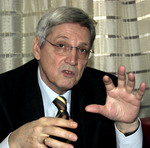- Serbia
Get to know Serbia
- Citizens
Culture and science
Health services
Pension and disability insurance
- Business
Employment
Economy
- Media
- Government
- Contact
Keep in touch
Contact form
Back
Keepin touch
Whether you have a question, comment, suggestion or any problem in the purview of the government, send us your message and we will try to respond as soon as possible. If your problem is not in our purview, we will forward your message to the relevant institution.
Q:
A:
Media’s role key in strengthening anti-corruption awareness
Belgrade,
23 September 2005
Serbian Minister of Justice Zoran Stojkovic has said that an action plan for the implementation of a national anti-corruption strategy, pending adoption in the Serbian parliament, is in preparation and that a working group has been formed to draft a bill that will create an independent anti-corruption agency.
In a statement to the Tanjug news agency, Stojkovic said that corruption is one of worst social phenomena, that it raises the price of economic production and represents a hard blow to the budget, and worst of all, it kills society’s so-called moral side.
Stojkovic pointed out that corruption can never be fully eradicated, but that it must be brought down to a “reasonable measure” and added that countries in transition and those where wars have been waged, do not have proper mechanisms to keep corruption in check.
He said that poverty in transition countries lead to ignorance of the damage corruption inflicts and the unacceptability of criminal acts, and that is why the media must play a key role, and added that the awareness of the damage caused by corruption can be achieved only by the spreading of the idea to the people.
Speaking about the widespread corruption in the judiciary system, Stojkovic said that the fight against this social evil was extremely difficult in the beginning, due to the closed structure of courts and their uncooperativeness.
Stojkovic said that it is of great importance that courts have recently had a large number of court proceedings aimed against corruption, and added that 80 or 90 percent of the honourable and honest people in the judiciary system must not allow the minority to downgrade their profession and the institutions where they work.
He said that Serbia has received praise for its combat against corruption, especially from Chairman of the Stability Pact Anti-Corruption Initiative Ugo Draetta and EU working group against corruption vice-president Drago Kosoje.
Slovenian representatives have been chosen as “mentors” since they have learnt from the Germans, and because they started from similar positions as Serbia, concluded Stojkovic.
Stojkovic pointed out that corruption can never be fully eradicated, but that it must be brought down to a “reasonable measure” and added that countries in transition and those where wars have been waged, do not have proper mechanisms to keep corruption in check.
He said that poverty in transition countries lead to ignorance of the damage corruption inflicts and the unacceptability of criminal acts, and that is why the media must play a key role, and added that the awareness of the damage caused by corruption can be achieved only by the spreading of the idea to the people.
Speaking about the widespread corruption in the judiciary system, Stojkovic said that the fight against this social evil was extremely difficult in the beginning, due to the closed structure of courts and their uncooperativeness.
Stojkovic said that it is of great importance that courts have recently had a large number of court proceedings aimed against corruption, and added that 80 or 90 percent of the honourable and honest people in the judiciary system must not allow the minority to downgrade their profession and the institutions where they work.
He said that Serbia has received praise for its combat against corruption, especially from Chairman of the Stability Pact Anti-Corruption Initiative Ugo Draetta and EU working group against corruption vice-president Drago Kosoje.
Slovenian representatives have been chosen as “mentors” since they have learnt from the Germans, and because they started from similar positions as Serbia, concluded Stojkovic.
-
 Belgrade/Brussels, 19 November 2025
Belgrade/Brussels, 19 November 2025European integration shared responsibility of entire society
-
 Belgrade, 29 October 2024
Belgrade, 29 October 2024State moves to minimise advertising for betting shops
-
 Belgrade/Berlin, 28 January 2016
Belgrade/Berlin, 28 January 2016Fences cannot stop migrations
-
 Belgrade, 7 January 2016
Belgrade, 7 January 2016Serbia to experience dynamic economic growth in 2016
-
 Belgrade, 31 December 2015
Belgrade, 31 December 2015Serbia will persevere on path of development, reforms
-
 Belgrade, 30 December 2015
Belgrade, 30 December 2015Ground for Serbia’s progress set
-
 Belgrade, 28 December 2015
Belgrade, 28 December 2015Serbia ready for improvement of cooperation with Russia
-
 Belgrade, 22 December 2015
Belgrade, 22 December 2015Serbia ready to open six more chapters next year
-
 Belgrade, 21 December 2015
Belgrade, 21 December 2015Serbia to be part of EU by 2020
-
 Belgrade, 20 December 2015
Belgrade, 20 December 2015Serbia ready for EU membership by 2019


